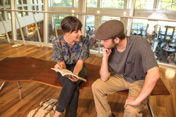Developing Critical Literacy
- Michelle Williams
- MBK Undergraduate Coordinator
- Residential College in the Arts and Humanities and School of Social Work

Nicole DiMichele and Zack Silverman review Educating African American Males (Watson and Smitherman).
 Nicole DiMichele encourages students in the My Brother's Keeper program to read and write about what they see happening around them. She then asks them to question those experiences and analyze them from different vantage points.
Nicole DiMichele encourages students in the My Brother's Keeper program to read and write about what they see happening around them. She then asks them to question those experiences and analyze them from different vantage points.
It can be a complex journey, and DiMichele has devoted considerable effort to creating strategies for critical literacy that will draw at-risk youth into articulating their experiences so they can learn to think all the way around different issues.
"The goal is to challenge them to look at a situation from multiple perspectives. We flip things around and try to introduce fresh thinking. Sometimes they get going very quickly, other times it's more of a struggle," said DiMichele.
Her work in My Brother's Keeper began as a student in Austin Jackson's "Third-Year Tutorial" (RCAH 380). Her research project consisted of a micro-ethnographic study of the ways the My Brother's Keeper Program infuses critical literacy into its curriculum.
Critical literacy is a core theory that seeks to build awareness of injustice, inequality, and power. When applied to educational content, teachers or facilitators draw students into awareness from viewpoints they may not have considered or been cognizant of. DiMichele advances the work of the My Brother's Keeper program by helping to construct curriculum with activities to empower student expression through writing, video, music, and drawing.
The concepts are loosely inspired by the Freedom Writers Foundation, an outreach organization formed from a successful writing program launched in a Los Angeles high school in the 1990s, where students were encouraged to write expressively about the adversity in their lives.
Working with Jackson, DiMichele has developed, refined, and tweaked curriculum content that addresses the students' lives in Detroit and facilitates expression for the intense feelings that middle school Black males experience as they try to sort out what is happening around them.
"This way of learning becomes meaningful outside of the classroom because they are talking about culturally relevant experiences. The kids accept and reinforce one another," says DiMichele. "They identify more strongly with each other, and it creates opportunities to further explore self-esteem, educational goals, dreams, and how to achieve success despite some of the difficulties they face."
According to DiMichele, the best activities have been those that allow for more unconventional and creative learning. The students have written poetry about what they love and what they dislike about their communities, painted landscapes and then constructed an artist's statement to explain their work, and used theater and performance to bring out their inventiveness and imagination.
DiMichele plans to enter an Advanced-Standing Master of Social Work program after her May 2015 graduation from MSU.
"I hope to continue working with the population I've focused on in the My Brother's Keeper program. I'm particularly interested in working at a macro level with education policy and the broader community and economic development," said DiMichele.
- Written by Carla Hills, University Outreach and Engagement